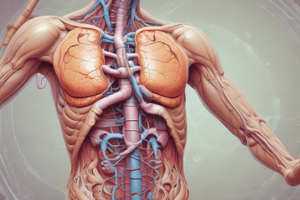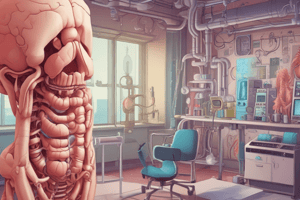Podcast
Questions and Answers
What is the primary mechanism of defecation in the human body?
What is the primary mechanism of defecation in the human body?
A spinal reflex with its center in the sacral segments of the spinal cord
What stimulates the nerve endings in the rectum during the defecation process?
What stimulates the nerve endings in the rectum during the defecation process?
Rectal distention caused by a mass movement of feces into the rectum
What is the function of the pancreatic juice in the small intestine?
What is the function of the pancreatic juice in the small intestine?
To neutralize HCl and raise the pH of the duodenal contents to 6.0-7.0
What is the approximate daily volume of pancreatic juice secreted into the small intestine?
What is the approximate daily volume of pancreatic juice secreted into the small intestine?
What type of fibers in the pelvic nerves are responsible for transmitting signals during the defecation reflex?
What type of fibers in the pelvic nerves are responsible for transmitting signals during the defecation reflex?
What is the name of the duct that joins the common bile duct to form the ampulla of Vater?
What is the name of the duct that joins the common bile duct to form the ampulla of Vater?
What is the purpose of the pancreatic enzymes in the small intestine?
What is the purpose of the pancreatic enzymes in the small intestine?
What is the name of the muscle that is relaxed during the defecation reflex?
What is the name of the muscle that is relaxed during the defecation reflex?
What is the name of the sphincter that encircles the orifice of the ampulla of Vater?
What is the name of the sphincter that encircles the orifice of the ampulla of Vater?
What is the final pH of the chyme in the jejunum after the action of pancreatic juice and other intestinal secretions?
What is the final pH of the chyme in the jejunum after the action of pancreatic juice and other intestinal secretions?
Flashcards are hidden until you start studying
Study Notes
Local Nervous Reflexes
- Distention of the stomach after meals initiates the gastroenteric reflex, which increases small intestinal peristaltic activity.
- Secretin and cholecystokinin also increase small intestinal secretion.
Hormonal Regulation
- Hormonal substances, such as secretin, cholecystokinin, gastrin, insulin, and serotonin, control intestinal secretion and motility.
- VIP (found in nerves in the gastrointestinal tract) stimulates intestinal secretion of electrolytes and water.
- Secretin and glucagon inhibit intestinal motility.
The Colon (Large Intestine)
Types of Movements
- Segmentation contractions facilitate absorption of fluids and electrolytes from the chyme.
- Peristaltic waves propel colonic contents toward the rectum.
- Mass movement is a modified type of peristalsis that occurs a few times a day, often after breakfast.
Migrating Motor Complex (MMC)
- Occurs during fasting in-between meals.
- Functions of MMC include:
- Moving undigested substances from the small intestine to the large intestine.
- Preventing bacteria from growing excessively in the small intestine.
Small Intestine Secretion
- Alkaline juice is secreted at a rate of 1800 ml/day with a pH of 7.5-8.0.
- Intestinal mucus (mucins) forms a protective blanket on the intestinal epithelium.
- Gastrointestinal hormones, such as secretin and cholecystokinin, increase small intestine and pancreatic secretions.
Enzymes in Small Intestine Secretion
- Peptidases split small peptides into amino acids.
- Enzymes (sucrase, maltase, isomaltase, and lactase) split disaccharides into monosaccharides.
- Small amounts of intestinal lipase split neutral fats into glycerol and fatty acids.
Regulation of Small Intestinal Functions
- Regulation of secretions and motility involve hormonal and neural control mechanisms.
Defecation
- Defecation is a spinal reflex with its center in the sacral segments of the spinal cord (parasympathetic defecation reflex).
- Rectal distention stimulates nerve endings in the rectum, leading to contraction of the smooth muscles of the distal colon and rectum and relaxation of the internal anal sphincter.
The Pancreas
- The exocrine portion of the pancreas secretes pancreatic juice containing zymogen granules.
- Pancreatic juice is alkaline with a high HCO3- content, neutralizing HCl and raising the pH of duodenal contents to 6.0-7.0.
- Pancreatic juice contains enzymes for digesting proteins, carbohydrates, and fats.
Studying That Suits You
Use AI to generate personalized quizzes and flashcards to suit your learning preferences.




